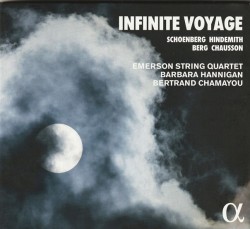 After a career of 47 years the renowned Emerson String Quartet is calling it a day and they have enrolled Canadian superstar Barbara Hannigan for their farewell offering, Infinite Voyage (Alpha 1000 outhere-music.com/en/albums/infinite-voyage). The disc opens gently with Paul Hindemith’s four-song cycle Melancholie, Op.13 which Hannigan’s pure soprano is the perfect vehicle for the poems of Christian Morgenstern. Set in memory of Hindemith’s friend Karl Köhler, whose death on the Western Front in 1918 left the composer devastated, noting “Everything is dreary and empty. I feel deathly sad.” This is followed by Alban Berg’s String Quartet, Op.3, with its references to Tristan und Isolde as a tribute to the composer’s beloved – and later its eerie prefiguring of the madness depicted in his own opera Wozzeck – in a deeply moving performance by the quartet. Pianist Bertrand Chamayou joins the others for Ernest Chausson’s Chanson perpétuelle, a setting of abridged verses from Charles Cros’ Nocturne in which the narrator, abandoned by her lover, prepares for suicide. At nearly half an hour, Schoenberg’s String Quartet No.2, in F-sharp Minor, Op.10 is the most substantive work presented here. The first two movements are scored for traditional string quartet. The first movement expands the tonality of the key signature without venturing too far outside the lines. Things begin to go astray in the second movement, when toward the end a fractured, but recognizable rendition of the popular song O du Lieber Augustine with it’s refrain “All is over” is heard. The third and fourth movements both feature soprano and the poetry of Stefan George: Litany built on motives from the previous movements using a text that opens “Deep is the sadness that gloomily comes over me”; and Ecstasy, in which there is no longer a key signature and the words begin “I feel air from another planet” as the work indeed leads us into a new world of tonality. Once again Hannigan’s is the perfect voice for this powerful and haunting work, which provides a fitting end to the Emerson Quartet’s “infinite voyage.” Their journey lasted most of half a century and they produced nearly three dozen recordings. The Emersons will be missed, but what a legacy!
After a career of 47 years the renowned Emerson String Quartet is calling it a day and they have enrolled Canadian superstar Barbara Hannigan for their farewell offering, Infinite Voyage (Alpha 1000 outhere-music.com/en/albums/infinite-voyage). The disc opens gently with Paul Hindemith’s four-song cycle Melancholie, Op.13 which Hannigan’s pure soprano is the perfect vehicle for the poems of Christian Morgenstern. Set in memory of Hindemith’s friend Karl Köhler, whose death on the Western Front in 1918 left the composer devastated, noting “Everything is dreary and empty. I feel deathly sad.” This is followed by Alban Berg’s String Quartet, Op.3, with its references to Tristan und Isolde as a tribute to the composer’s beloved – and later its eerie prefiguring of the madness depicted in his own opera Wozzeck – in a deeply moving performance by the quartet. Pianist Bertrand Chamayou joins the others for Ernest Chausson’s Chanson perpétuelle, a setting of abridged verses from Charles Cros’ Nocturne in which the narrator, abandoned by her lover, prepares for suicide. At nearly half an hour, Schoenberg’s String Quartet No.2, in F-sharp Minor, Op.10 is the most substantive work presented here. The first two movements are scored for traditional string quartet. The first movement expands the tonality of the key signature without venturing too far outside the lines. Things begin to go astray in the second movement, when toward the end a fractured, but recognizable rendition of the popular song O du Lieber Augustine with it’s refrain “All is over” is heard. The third and fourth movements both feature soprano and the poetry of Stefan George: Litany built on motives from the previous movements using a text that opens “Deep is the sadness that gloomily comes over me”; and Ecstasy, in which there is no longer a key signature and the words begin “I feel air from another planet” as the work indeed leads us into a new world of tonality. Once again Hannigan’s is the perfect voice for this powerful and haunting work, which provides a fitting end to the Emerson Quartet’s “infinite voyage.” Their journey lasted most of half a century and they produced nearly three dozen recordings. The Emersons will be missed, but what a legacy!
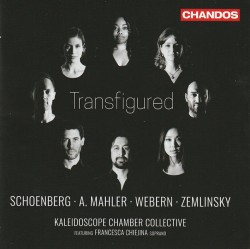 Transfigured featuring the Kaleidoscope Chamber Collective and soprano Francesca Chiejina (Chandos CHAN 20277 chandos.net/products/catalogue/CHAN%2020277) presents a program of chamber music from the turn of the 20th century with and without voice. The disc begins with Alexander von Zemlinsky’s Maiblumen blühten überall for soprano and string sextet from 1898, a setting of Richard Dehmel’s gruesome poem that translates to Lilies-of-the-valley blossomed everywhere, which ends “and the sun burned him to death in the corn.” Anton Webern’s 1907 Quintet for Piano and Strings, at 13 minutes is one of the composer’s most sustained works. Written early in his studies with Schoenberg, it shows some influence of Zemlinsky, his orchestration teacher, and certainly an appreciation of Brahms, as well as an understanding of his new mentor’s ideas. Zemlinsky, Schoenberg’s teacher and later his brother-in-law, also numbered among his students Alma Schindler, who became his lover before her marriage to Gustav Mahler in 1902. She wrote a variety of compositions before her marriage, but Mahler decreed that his wife would have to give up composing. He later relented somewhat and in 1910 sent her music to Universal Edition who published some of the songs recorded here. Kaleidoscope pianist Tom Poster has arranged them quite effectively for soprano and string sextet and in this form they perfectly complement the other repertoire on the disc. Chiejina’s dark, dramatic voice is well suited to these songs which actually show more affinity with the world of Zemlinsky and Schoenberg than that of Mahler. In 1899 Schoenberg wrote the string sextet Verklärte Nacht (Transfigured Night) which remains his most celebrated work, with the possible exception of the mammoth Gurrelieder published a decade later. Like Zemlinsky’s Maiblumen and the first of Alma’s songs presented here, Die stille Stadt, it is based on an emotionally charged poem by Dehmel. In this case however, the text is interpreted solely through music in an extended and gripping tone poem replete with sturm und drang. As the notes tell us, “indebted to Brahms in its string sextet form, the work seemed to be a deliberate repudiation of such a soundworld and its harmonic rules.” Although still some years away from his development of the “atonal” 12-note system of composition, and still using a traditional key signature (D minor), in this seminal work Schoenberg expands the tonality, stretching it almost to the breaking point while still conveying the depths of emotion in this star-crossed love story. Kaleidoscope rises and falls exquisitely with all the rollercoaster twists and turns of the plot until eventually, a half hour later, the quiet and compassionate resolution brings this very satisfying disc to a resplendent close.
Transfigured featuring the Kaleidoscope Chamber Collective and soprano Francesca Chiejina (Chandos CHAN 20277 chandos.net/products/catalogue/CHAN%2020277) presents a program of chamber music from the turn of the 20th century with and without voice. The disc begins with Alexander von Zemlinsky’s Maiblumen blühten überall for soprano and string sextet from 1898, a setting of Richard Dehmel’s gruesome poem that translates to Lilies-of-the-valley blossomed everywhere, which ends “and the sun burned him to death in the corn.” Anton Webern’s 1907 Quintet for Piano and Strings, at 13 minutes is one of the composer’s most sustained works. Written early in his studies with Schoenberg, it shows some influence of Zemlinsky, his orchestration teacher, and certainly an appreciation of Brahms, as well as an understanding of his new mentor’s ideas. Zemlinsky, Schoenberg’s teacher and later his brother-in-law, also numbered among his students Alma Schindler, who became his lover before her marriage to Gustav Mahler in 1902. She wrote a variety of compositions before her marriage, but Mahler decreed that his wife would have to give up composing. He later relented somewhat and in 1910 sent her music to Universal Edition who published some of the songs recorded here. Kaleidoscope pianist Tom Poster has arranged them quite effectively for soprano and string sextet and in this form they perfectly complement the other repertoire on the disc. Chiejina’s dark, dramatic voice is well suited to these songs which actually show more affinity with the world of Zemlinsky and Schoenberg than that of Mahler. In 1899 Schoenberg wrote the string sextet Verklärte Nacht (Transfigured Night) which remains his most celebrated work, with the possible exception of the mammoth Gurrelieder published a decade later. Like Zemlinsky’s Maiblumen and the first of Alma’s songs presented here, Die stille Stadt, it is based on an emotionally charged poem by Dehmel. In this case however, the text is interpreted solely through music in an extended and gripping tone poem replete with sturm und drang. As the notes tell us, “indebted to Brahms in its string sextet form, the work seemed to be a deliberate repudiation of such a soundworld and its harmonic rules.” Although still some years away from his development of the “atonal” 12-note system of composition, and still using a traditional key signature (D minor), in this seminal work Schoenberg expands the tonality, stretching it almost to the breaking point while still conveying the depths of emotion in this star-crossed love story. Kaleidoscope rises and falls exquisitely with all the rollercoaster twists and turns of the plot until eventually, a half hour later, the quiet and compassionate resolution brings this very satisfying disc to a resplendent close.
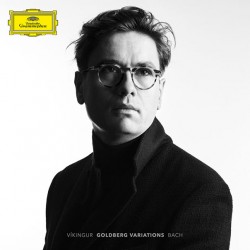 I have spent some time in recent months sorting through several thousand LPs in my basement and came across Glenn Gould’s two iconic recordings of Bach’s Goldberg Variations. I took the opportunity to give them both a spin and was surprised at just how much I appreciated Gould’s “mature” 1981 version (51 minutes) with its leisurely approach versus the sprightly, often breakneck tempos of his youthful 1955 debut (38 minutes). A few days after this comparative listening session a new recording of the Goldbergs by Icelander Vikingur Ólafsson arrived at my desk (Deutsche Grammophon 486 4553 vikingurolafsson.com) and to my surprise, I now have a new favourite of this much-recorded work. As the opening Aria began, I got the impression that, as with the elder Gould, I was in for another treat and settled in for a smooth and relaxing ride, but soon had to fasten my seatbelt; a number of the 30 variations proved to be as nimble and breathtaking as the young Gould’s renderings. It is simply astounding to me that fingers can actually move that quickly and articulately. That notwithstanding, the relationship between the slow and fast movements and overall arc of the trajectory from opening aria to closing reprise gave the impression of a thoughtful, relaxed and balanced performance. It has always surprised me that a work commissioned by an insomniac to ease him through long, sleepless nights is quite so active and engaging. I would have expected the intention to be more of a sleep-aid than an entertainment. In spite of his virtuosic dexterity in the faster variations, I found Ólafsson’s interpretation to be more in keeping with my own sensibilities in this regard. I was quite surprised to find that this new recording is virtually twice as long as Gould’s original, despite Ólafsson’s equally fast tempos in some of the variations. I had to refer to the score to confirm my suspicion that, as is somewhat common practice, Gould omitted the second (and I think even some of the first) repeats, whereas Ólafsson plays them all, giving an outstanding performance that lasts some 74 minutes.
I have spent some time in recent months sorting through several thousand LPs in my basement and came across Glenn Gould’s two iconic recordings of Bach’s Goldberg Variations. I took the opportunity to give them both a spin and was surprised at just how much I appreciated Gould’s “mature” 1981 version (51 minutes) with its leisurely approach versus the sprightly, often breakneck tempos of his youthful 1955 debut (38 minutes). A few days after this comparative listening session a new recording of the Goldbergs by Icelander Vikingur Ólafsson arrived at my desk (Deutsche Grammophon 486 4553 vikingurolafsson.com) and to my surprise, I now have a new favourite of this much-recorded work. As the opening Aria began, I got the impression that, as with the elder Gould, I was in for another treat and settled in for a smooth and relaxing ride, but soon had to fasten my seatbelt; a number of the 30 variations proved to be as nimble and breathtaking as the young Gould’s renderings. It is simply astounding to me that fingers can actually move that quickly and articulately. That notwithstanding, the relationship between the slow and fast movements and overall arc of the trajectory from opening aria to closing reprise gave the impression of a thoughtful, relaxed and balanced performance. It has always surprised me that a work commissioned by an insomniac to ease him through long, sleepless nights is quite so active and engaging. I would have expected the intention to be more of a sleep-aid than an entertainment. In spite of his virtuosic dexterity in the faster variations, I found Ólafsson’s interpretation to be more in keeping with my own sensibilities in this regard. I was quite surprised to find that this new recording is virtually twice as long as Gould’s original, despite Ólafsson’s equally fast tempos in some of the variations. I had to refer to the score to confirm my suspicion that, as is somewhat common practice, Gould omitted the second (and I think even some of the first) repeats, whereas Ólafsson plays them all, giving an outstanding performance that lasts some 74 minutes.
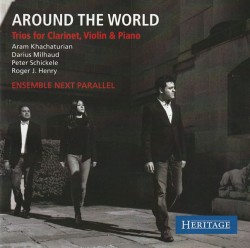 One of my great pleasures this past summer was reading Ma vie heureuse (My Happy Life) by Darius Milhaud (1892-1974). I was quite surprised to discover that this prolific French composer, a member of Les Six, is sadly underrepresented in current commercial recordings and on websites like YouTube and Spotify. My own collection, built over the past half century, is thankfully more complete than what’s out there currently, so I was nonetheless able to revisit some of Milhaud’s wonderful compositions in conjunction with his delightful memoire. That being said, I was pleased to receive a new disc from clarinetist Yevgeny Dokshansky recently featuring Milhaud’s Suite for Clarinet, Violin, and Piano Op.157b (1936), comprising charming movements excepted from the music for a play by Jean Anouilh. Around the World: Trios for Clarinet, Violin and Piano performed by Ensemble Next Parallel (Heritage Records HTGCD170 heritage-records.com) also includes work by Milhaud’s contemporary, Armenian Aram Khachaturian, and living composers Peter Schickele (USA) and Roger J. Henry (Trinidad and Tobago). Khachaturian’s trio has a Romantic sensibility, and its final movement draws on an Uzbek folk melody. In Serenade for Three, Schickele is up to his usual tricks, particularly in the final movement’s perpetually rising variations on a theme from his alter ego PDQ Bach’s oratorio Oedipus Tex. Henry’s Caribbean infused music is actually not dissimilar to the sounds of Brazil that so inspired Milhaud most of a century earlier.
One of my great pleasures this past summer was reading Ma vie heureuse (My Happy Life) by Darius Milhaud (1892-1974). I was quite surprised to discover that this prolific French composer, a member of Les Six, is sadly underrepresented in current commercial recordings and on websites like YouTube and Spotify. My own collection, built over the past half century, is thankfully more complete than what’s out there currently, so I was nonetheless able to revisit some of Milhaud’s wonderful compositions in conjunction with his delightful memoire. That being said, I was pleased to receive a new disc from clarinetist Yevgeny Dokshansky recently featuring Milhaud’s Suite for Clarinet, Violin, and Piano Op.157b (1936), comprising charming movements excepted from the music for a play by Jean Anouilh. Around the World: Trios for Clarinet, Violin and Piano performed by Ensemble Next Parallel (Heritage Records HTGCD170 heritage-records.com) also includes work by Milhaud’s contemporary, Armenian Aram Khachaturian, and living composers Peter Schickele (USA) and Roger J. Henry (Trinidad and Tobago). Khachaturian’s trio has a Romantic sensibility, and its final movement draws on an Uzbek folk melody. In Serenade for Three, Schickele is up to his usual tricks, particularly in the final movement’s perpetually rising variations on a theme from his alter ego PDQ Bach’s oratorio Oedipus Tex. Henry’s Caribbean infused music is actually not dissimilar to the sounds of Brazil that so inspired Milhaud most of a century earlier.
Listen to 'Around the World' Now in the Listening Room
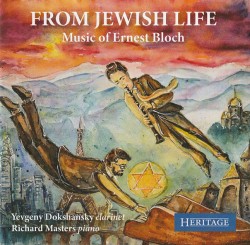 Yevgeny Dokshansky also included his earlier Heritage release featuring another of my mid-century favourite composers – From Jewish Life: The Music of Ernest Bloch – on which he is accompanied by pianist Richard Masters. Another welcome addition to my collection.
Yevgeny Dokshansky also included his earlier Heritage release featuring another of my mid-century favourite composers – From Jewish Life: The Music of Ernest Bloch – on which he is accompanied by pianist Richard Masters. Another welcome addition to my collection.
Regional Roots Roundup
As I write this in early November, I have just enjoyed a heady evening at the new Hugh’s Room Live. It was my maiden voyage to the venue on Broadview Avenue, and I must say I was mightily impressed with the layout and the acoustics of the former Broadview Avenue Congregational Church, an 1894 structure designed by iconic Toronto architect E.J. Lennox. Unfortunately the venue is not yet wheelchair accessible, but press releases assure us it is a priority to rectify this as soon as possible.
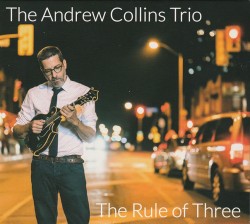 The occasion of my outing involved the launch of the Andrew Collins Trio CD The Rule of Three (andrewcollinstrio.com). The musicianship of this band is outstanding; between the three of them they cover mandolin(s), mandola, mandocello, string bass, guitar and fiddle(s). As to what kind of music they play, Collins is the first to admit it’s hard to describe. He’s even written a song about it that you can check out on YouTube: I Don’t Know (But I Like It). The influences are diverse. While leaning heavily to bluegrass, there’s a healthy mix of western swing, old-time, folky singer/songwriter, a bit of pop – including a tune by Pink Floyd – and straight up classical, with a remarkable rendition of Debussy’s Clair de Lune on this new album. Although mostly a string band, not all of the repertoire is instrumental. Vocals are mostly taken care of by Collins, with bass player James McEleney providing sweet harmonies and occasional leads. The Rule of Three opens with Contranym, which Collins explained refers to words which are also their own opposites, such as cleave or sanction. It’s not a word I was familiar with, but in one of life’s little synchronicities Contranyms came up as a category on the episode of Jeopardy I watched the very next day. Other highlights for me include the raucous How Do You Get to Carnegie Hall, the balladic title track, the dizzyingly virtuosic Fleabag and That Jethro Really Burns!, a swinging tribute to Kenneth C. “Jethro” Burns of Homer and Jethro fame.
The occasion of my outing involved the launch of the Andrew Collins Trio CD The Rule of Three (andrewcollinstrio.com). The musicianship of this band is outstanding; between the three of them they cover mandolin(s), mandola, mandocello, string bass, guitar and fiddle(s). As to what kind of music they play, Collins is the first to admit it’s hard to describe. He’s even written a song about it that you can check out on YouTube: I Don’t Know (But I Like It). The influences are diverse. While leaning heavily to bluegrass, there’s a healthy mix of western swing, old-time, folky singer/songwriter, a bit of pop – including a tune by Pink Floyd – and straight up classical, with a remarkable rendition of Debussy’s Clair de Lune on this new album. Although mostly a string band, not all of the repertoire is instrumental. Vocals are mostly taken care of by Collins, with bass player James McEleney providing sweet harmonies and occasional leads. The Rule of Three opens with Contranym, which Collins explained refers to words which are also their own opposites, such as cleave or sanction. It’s not a word I was familiar with, but in one of life’s little synchronicities Contranyms came up as a category on the episode of Jeopardy I watched the very next day. Other highlights for me include the raucous How Do You Get to Carnegie Hall, the balladic title track, the dizzyingly virtuosic Fleabag and That Jethro Really Burns!, a swinging tribute to Kenneth C. “Jethro” Burns of Homer and Jethro fame.
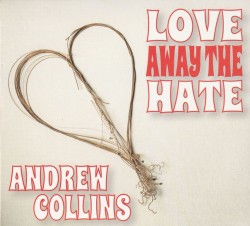 Collins also spoke about the strange experience of sheltering in place during the pandemic, a time spent playing alone and writing mandolin tunes. The result was the 2022 solo release Love Away the Hate on which he performs admirably as a one-man band, combining mandolin, mandola, mandocello, violin and guitar arrangements of ten tunes also available in notation and tablature in an accompanying book of sheet music. I look forward to using this to hone my own mandolin skills!
Collins also spoke about the strange experience of sheltering in place during the pandemic, a time spent playing alone and writing mandolin tunes. The result was the 2022 solo release Love Away the Hate on which he performs admirably as a one-man band, combining mandolin, mandola, mandocello, violin and guitar arrangements of ten tunes also available in notation and tablature in an accompanying book of sheet music. I look forward to using this to hone my own mandolin skills!
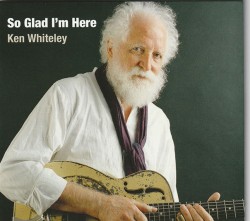 The new Hugh’s Room doesn’t have a kitchen, so rather than the dinner club aspect of the original venue, focus is on the intimate concert hall setting so well appreciated by the audience. One potential casualty of this format is Ken Whiteley’s Gospel Brunches, a treasured monthly feature at the old location. Fortunately, Whiteley has adapted his approach. The first Gospel Matinee took place on Sunday November 12 and presumably will continue in the new year. The first installment served as a launch for Whiteley’s latest CD So Glad I’m Here (kenwhiteley.com) featuring a special guest – Iranian tar and oud master Davod Azad – giving an ecumenical take on the gospel genre. On it, Whiteley plays a host of instruments, including guitar and resophonic guitar, accordion, mandolin and Hammond organ among others, with George Koller on bass, Bucky Berger on drums and half a dozen supporting musicians and singers, all making “a joyful noise unto the Lord.” The repertoire involves traditional gospel tunes adapted and arranged by Whiteley, along with several originals, including the anthemic (My God Is) Bigger Than That (a sentiment I much prefer to the one more common in this troubled world, “My God is Bigger than Yours!”). One of the real rockers is Gospel Ship which is kind of a family affair with brother Chris Whiteley on harmonica and son Ben on bass, along with full chorus. Azad’s ethereal introduction to Reverend Dan Smith’s This Is The Lord’s House sets the stage for a truly welcoming invitation for everyone to come in and “taste the bread of life.” Each of the nine songs is a treasure, but a highlight is the title track with Whiteley’s finger style guitar intro and Azad’s solo, which is a true stunner. The penultimate track, It’s Gonna Rain, is superb.
The new Hugh’s Room doesn’t have a kitchen, so rather than the dinner club aspect of the original venue, focus is on the intimate concert hall setting so well appreciated by the audience. One potential casualty of this format is Ken Whiteley’s Gospel Brunches, a treasured monthly feature at the old location. Fortunately, Whiteley has adapted his approach. The first Gospel Matinee took place on Sunday November 12 and presumably will continue in the new year. The first installment served as a launch for Whiteley’s latest CD So Glad I’m Here (kenwhiteley.com) featuring a special guest – Iranian tar and oud master Davod Azad – giving an ecumenical take on the gospel genre. On it, Whiteley plays a host of instruments, including guitar and resophonic guitar, accordion, mandolin and Hammond organ among others, with George Koller on bass, Bucky Berger on drums and half a dozen supporting musicians and singers, all making “a joyful noise unto the Lord.” The repertoire involves traditional gospel tunes adapted and arranged by Whiteley, along with several originals, including the anthemic (My God Is) Bigger Than That (a sentiment I much prefer to the one more common in this troubled world, “My God is Bigger than Yours!”). One of the real rockers is Gospel Ship which is kind of a family affair with brother Chris Whiteley on harmonica and son Ben on bass, along with full chorus. Azad’s ethereal introduction to Reverend Dan Smith’s This Is The Lord’s House sets the stage for a truly welcoming invitation for everyone to come in and “taste the bread of life.” Each of the nine songs is a treasure, but a highlight is the title track with Whiteley’s finger style guitar intro and Azad’s solo, which is a true stunner. The penultimate track, It’s Gonna Rain, is superb.
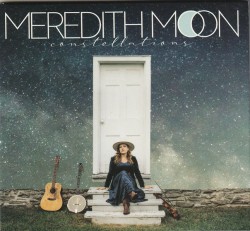 There are several connections to the preceding in Constellations, the new album by Canadian Appalachian clawhammer-style banjo playing, guitar picking singer/songwriter Meredith Moon (True North Records TND807 meredithmoon.com). The CD was recorded, mixed and mastered by Andrew Collins and the Toronto launch took place at Hugh’s Room Live back in October. Eight of the ten tracks are self-penned, mostly self-accompanied ballads with an old-time feel. One exception is Soldier’s Joy including bass and subtle drums and a fiddle break from Tony Allen, with strangely dark lyrics about the whiskey/beer/morphine concoction used in the 19th century in lieu of anesthetic for battlefield surgeries. I had not heard the words before and only knew it as an upbeat traditional fiddle tune. Quite a surprise! The other is Needlecase Medley, another traditional offering, in this case solo banjo with Moon accompanying herself with podorythmie (foot tapping common in Québécois and Acadian music). Other highlights include the beautiful title track, a nostalgic look back at the wanderlust of Moon’s earlier days, and the closer, Slow Moving Train, a haunting depiction of time rolling on.
There are several connections to the preceding in Constellations, the new album by Canadian Appalachian clawhammer-style banjo playing, guitar picking singer/songwriter Meredith Moon (True North Records TND807 meredithmoon.com). The CD was recorded, mixed and mastered by Andrew Collins and the Toronto launch took place at Hugh’s Room Live back in October. Eight of the ten tracks are self-penned, mostly self-accompanied ballads with an old-time feel. One exception is Soldier’s Joy including bass and subtle drums and a fiddle break from Tony Allen, with strangely dark lyrics about the whiskey/beer/morphine concoction used in the 19th century in lieu of anesthetic for battlefield surgeries. I had not heard the words before and only knew it as an upbeat traditional fiddle tune. Quite a surprise! The other is Needlecase Medley, another traditional offering, in this case solo banjo with Moon accompanying herself with podorythmie (foot tapping common in Québécois and Acadian music). Other highlights include the beautiful title track, a nostalgic look back at the wanderlust of Moon’s earlier days, and the closer, Slow Moving Train, a haunting depiction of time rolling on.
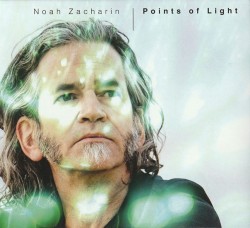 I’m surprised and a little embarrassed to say that I had never heard of Canadian singer/songwriter Noah Zacharin until his ninth CD Points of Light (noahsong.com) landed on my desk. I’m sorry to have come so late to the parade because Zacharin is really something. In addition to his solo career in which he has opened for the likes of Odetta, Dave van Ronk and Fairport Convention, he has appeared as a musician or producer on some 65 albums by artists from across North America. This latest disc showcases his outstanding finger-style guitar chops accompanying his solo vocals in storytelling ballads, as well as full band versions of another half a dozen songs in various styles from the gentle and gorgeous (My Love is a) Red Red Bird featuring Denis Keldie (B3) and Burke Carroll (pedal steel) to some rollicking blues and honkytonk tunes to me reminiscent of the late Mose Scarlett and (Chris and Ken Whiteley’s) Original Sloth Band, with help from Gary Craig (drums), Russ Boswell (bass) with cameos from Kevin Turcotte (trumpet) and Roly Platt (harmonica). The disc opens in solo mode with Ten Tons of Road, a paean to love and the call of the road, and continues with one of my favourites 17 Minute, an anti-lament of sorts for past loves. Zacharin seems content to let the past go, with no hard feelings putting me in mind of Tom Rush’s iconic No Regrets. Something Like a River is a solo acoustic guitar instrumental depicting a stretch of the York River in the Canadian Shield where Zacharin spends time in an off-grid cabin. The disc ends quietly with the lovely Been a Long Day, just guitar and voice complemented by an inobtrusive, though lush, string arrangement by Drew Jurecka. I’m so glad that Points of Light found its way to me.
I’m surprised and a little embarrassed to say that I had never heard of Canadian singer/songwriter Noah Zacharin until his ninth CD Points of Light (noahsong.com) landed on my desk. I’m sorry to have come so late to the parade because Zacharin is really something. In addition to his solo career in which he has opened for the likes of Odetta, Dave van Ronk and Fairport Convention, he has appeared as a musician or producer on some 65 albums by artists from across North America. This latest disc showcases his outstanding finger-style guitar chops accompanying his solo vocals in storytelling ballads, as well as full band versions of another half a dozen songs in various styles from the gentle and gorgeous (My Love is a) Red Red Bird featuring Denis Keldie (B3) and Burke Carroll (pedal steel) to some rollicking blues and honkytonk tunes to me reminiscent of the late Mose Scarlett and (Chris and Ken Whiteley’s) Original Sloth Band, with help from Gary Craig (drums), Russ Boswell (bass) with cameos from Kevin Turcotte (trumpet) and Roly Platt (harmonica). The disc opens in solo mode with Ten Tons of Road, a paean to love and the call of the road, and continues with one of my favourites 17 Minute, an anti-lament of sorts for past loves. Zacharin seems content to let the past go, with no hard feelings putting me in mind of Tom Rush’s iconic No Regrets. Something Like a River is a solo acoustic guitar instrumental depicting a stretch of the York River in the Canadian Shield where Zacharin spends time in an off-grid cabin. The disc ends quietly with the lovely Been a Long Day, just guitar and voice complemented by an inobtrusive, though lush, string arrangement by Drew Jurecka. I’m so glad that Points of Light found its way to me.
Listen to 'Points of Light' Now in the Listening Room
We invite submissions. CDs, DVDs and comments should be sent to: DISCoveries, The WholeNote c/o Music Alive, The Centre for Social Innovation, 720 Bathurst St. Toronto ON M5S 2R4 or to discoveries@thewholenote.com.



